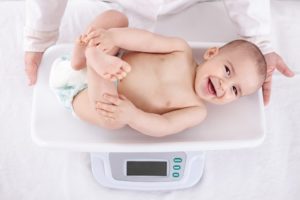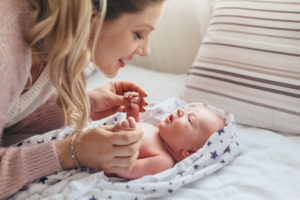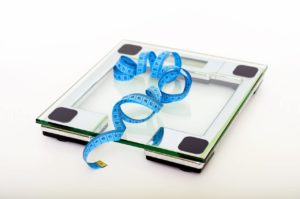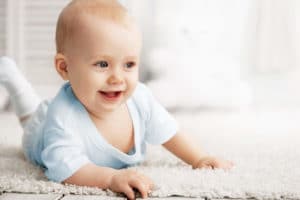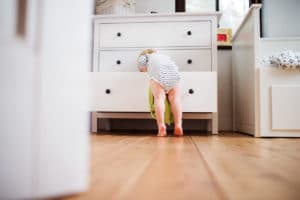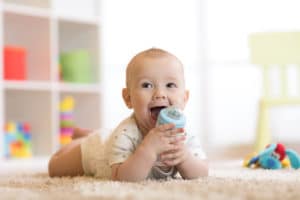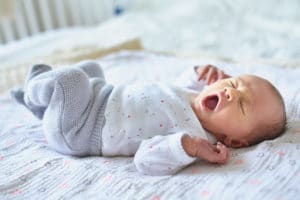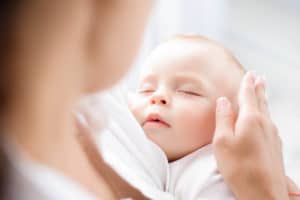Your offspring is in the 4th month of life and can infect the whole family with his laughter. Around the 18th week of life, your offspring becomes more active and starts to explore objects with his mouth.
The baby’s last growth sp urt was just a few weeks ago and it is possible that your offspring is still struggling with it. Learn more about baby’s growth spurt and physical and mental development.
Table of contents
Baby’s Dat 18 Weeks: The Next Growth Spurt Is Just Around The Corner
When your baby turns 18 weeks old, he or she is busy with hand-mouth coordination and the senses are being diligently trained. The next growth spurt of the baby follows in the 19th week. Your offspring is no longer gaining so much weight, as it is actively exploring its environment and consuming a lot of energy in the process.
- Also Interesting:
- The best hammocks for babies
- Recommended products for baby care
- The best bath tubs for babies
The last growth spurt in the baby was about 6 weeks ago and led to an important progress: social behavior. This third baby growth spurt is one of 8 major developmental leaps.
When your baby turns 18 weeks, it is possible that he or she will still be struggling with this jump, as growth spurts are very demanding for the child’s brain. As soon as it has processed this development, the next growth spurt is already imminent for the baby in the 19th week.
Your offspring is probably unhappy now and will need more closeness. However, it can also be calmed down through variety. Go for a walk with your little one or look around the house together. This will help your baby cope with the next growth spurt.
Baby Development: Motor Skills And Reflexes
The development of babies is particularly fascinating: while they are equipped with early childhood reflexes in the first few weeks, these gradually give way to coordinated movements in the 4th month of life. The grasping reflex gradually regresses and your child begins to consciously grasp objects and tries to hold on to them.
Before that, holding onto an object was an automatic process. Although targeted grasping is not yet possible, your baby uses its mouth to help during this phase. In this way, it can feel and sense objects. Letting go of the baby toy doesn’t really work yet either, as the grasping reflex can sometimes still get in the way.
Over the weeks, your 18-week-old baby has diligently strengthened his neck muscles. By now, he is able to hold his head securely. When your offspring feels solid ground under its feet, it will try to push its legs through. This is an important preliminary stage for later standing and walking.
Baby Development: The First Milk Teeth
As a rule, you can expect the first milk tooth of your offspring between when your baby is 6 months. However, some babies experience their first tooth eruption as early as 3 or 4 months. The following symptoms indicate the coming of milk teeth:
- Your baby sleeps restlessly.
- The gums are swollen and you can see whitish spots.
- Your baby cries loudly and seemingly without reason.
- Your baby cries in the evening.
- Increased salivation.
- The temperature is slightly elevated.
- He sucks his fingers or hand.
- The cheeks are red.
- Your baby has diarrhea or a sore bottom.
Baby’s Development At 18 Weeks: How The Senses Change
When your baby turns 18 weeks old, he’s ready to conquer the world. His abilities increase day by day and he hears and sees better and better.
Although babies can already see in the womb, their vision is not as well developed after birth. At first, your offspring’s perception of the world was rather blurred. At 18 months, however, your baby’s vision has developed rapidly: Your baby can now see more clearly than before.
He can follow a ball rolling by with his eyes and spot the smallest objects on the ground. Your offspring is now also able to distinguish between different shades of color. He now also pays attention to small and complicated patterns.
During these weeks, your child makes significant progress in the area of hearing. They are important for the baby’s linguistic development. Until now, your child has only paid attention to whether a voice sounds friendly, angry, or reassuring.
Slowly, however, your offspring will also succeed in filtering out smaller sections and sounds from the speech he hears. The baby gradually discovers that certain sound units are assigned a specific meaning.
Your baby’s hearing and speech development are instinctive. Your little treasure now begins to engage you in detailed babbling and babbling dialogues. Even though your baby has become more independent and self-sufficient, he or she still needs cuddles, kisses, and gentle massages.
This makes your little one happy and at the same time promotes the sense of touch. Developing the sense of touch advances the baby’s overall development and helps him become aware of his own body.
Piaget’s Object Permanence: What Is It?
The well-known Swiss developmental psychologist coined the term object permanence. This means that children of a certain age understand that things and people continue to exist even after they have disappeared from the baby’s field of vision.
Object permanence develops when your baby is 8 months old. By the time your baby is 18 weeks old, he may already understand that you are just going somewhere else and that he can call you back. However, it takes until 8 to 12 months of age for him to sufficiently internalize this realization.
Baby 18 Weeks: Emotional Development
Your baby’s emotional development is also progressing quickly. Your offspring is getting better and better at expressing his or her feelings. If your baby likes an object and it is out of his reach, he may become restless and feel frustrated.
He expresses his feelings through facial expressions, sounds, and crying. In this month, however, it can already give your family a joyful smile. So 4-month-old babies have a particularly intense emotional world. It is therefore important to offer your little one comfort and understanding when he or she is unhappy.
Baby At 18 Weeks: Social Development And Communication
As your baby turns 18 weeks, he or she becomes more and more active in family life. He wants to communicate with you and watches your mouth very carefully. Whereas in the last few weeks your baby has been making sounds at the same time as you, he is now starting to communicate with you in a reciprocal way.
He waits until you have said something and then babbles back in his own language.
Baby 18 Weeks: Sleep Rhythm
Babies sleep a lot, but rarely for long periods at a time. When your baby turns 4 months old, he or she gradually begins to develop a more regular sleep pattern. Your baby will now be able to sleep for about two to four hours at a time.
The sleep requirement per day is 14.5 hours. This is now mainly covered at night. During the day, your baby now needs about two to three naps. These usually last one to one and a half hours. Put your baby to bed between 6 and 8 p.m., depending on his sleep routine.
This Is How You Can Playfully Encourage Your Baby At 18 Weeks
In the 4th month, due to the growth spurt, there are many new possibilities to playfully encourage your offspring. Rocking games: At this age, your baby loves rocking. Make yourselves comfortable together in the rocking chair and sing a song to your baby.
Alternatively, you can recite a rhyme or play a finger game with him. This will help develop your little explorer’s sense of hearing and logical thinking. Babbling, funny noises and rattles: Use this developmental phase to introduce your baby to as many sounds, noises and tones as possible.
If you babble and make funny noises, your child will see this as an opportunity to use his own vocal instrument and babble back. Some babies just listen intently. Rattles and other sounding toys train your offspring’s hearing.
An Overview Of Baby’s Development At 18 Weeks
- The growth spurt in babies gradually slows down.
- Your baby may still be struggling with the growth spurt from week 12.
- The grasping reflex is slowly regressing.
- Your baby is consciously holding objects.
- Your offspring can hold its head by itself.
- It tries to push its legs through when it feels solid ground under its feet.
- Some babies start teething at this age.
- Your baby can follow objects rolling by with its eyes and recognizes the smallest objects on the ground.
- Complex and small patterns now attract your baby’s attention.
- He can distinguish the finest nuances of color from one another.
- Your baby learns to filter out sounds from the speech he hears.
- He understands that certain sounds have a specific meaning.
- Your baby begins to babble.
- Your baby begins to internalize the so-called “object permanence”.
- At 18 weeks, your offspring can express their feelings better and better.
- Your baby now needs about 2 to 3 daytime naps, while the remaining sleep needs are met at night.
Conclusion
In the 18th week, the next growth spurt in the baby is imminent. It is one of a total of eight major developmental leaps. In this phase, your offspring needs a lot of closeness and attention.
Although the grasping reflex is increasingly regressing and your baby is consciously grasping objects, grasping does not yet function in a targeted manner. Therefore, your offspring likes to use its mouth to explore the objects.
In the meantime, your child is also able to hold his head by himself and when he feels solid ground under his feet, he stretches his legs. Your child is now slowly internalizing the principle of object permanence.
He understands that people and things still exist, even if they have disappeared from his field of vision. When your baby reaches 18 weeks, he will be able to express his emotions better and better. Babbling and bubbling are particularly fun for your offspring now and promote the baby’s linguistic development.



